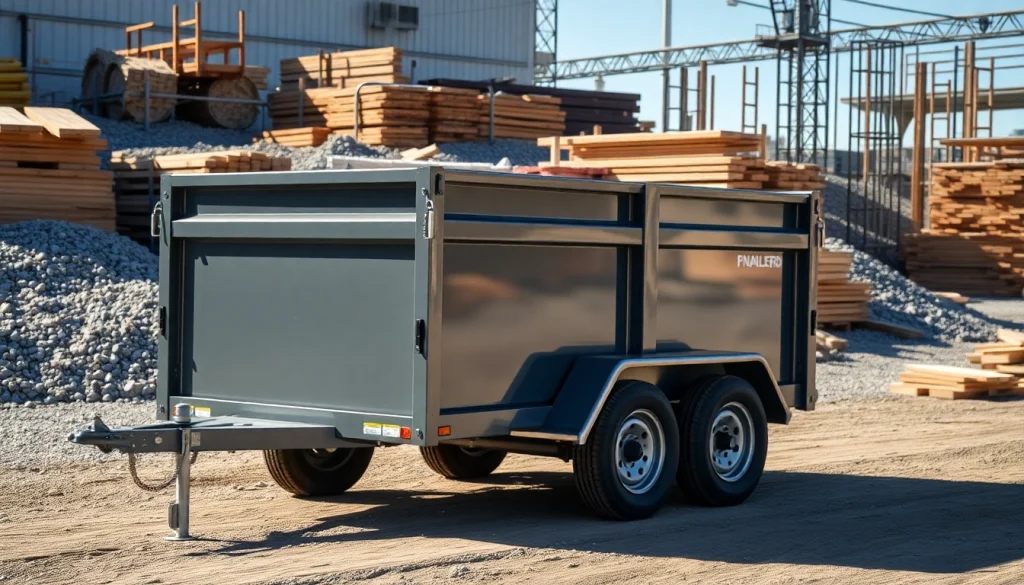Understanding Dumpster Trailers for Sale
In the waste management and construction industries, efficiency and effectiveness are paramount, and the use of dumpster trailers is a solution that caters to these needs. Dumpster trailers for sale provide an excellent means to transport and dispose of a variety of materials, making them a vital tool for both residential and commercial use. In this guide, we will unpack the essential aspects of dumpster trailers, helping you understand their purpose, types, key features, benefits, common uses, and maintenance practices.
Definition and Purpose
Dumpster trailers, commonly known as dump trailers, are specialized trailers designed for the transportation of debris, waste, and other materials. Unlike traditional dumpsters, these trailers can be towed by various vehicles, allowing for greater mobility and flexibility. They serve multiple purposes, from facilitating residential clean-outs and renovations to supporting large-scale construction and demolition projects.
Types of Dumpster Trailers Available
There is a diverse range of dumpster trailers on the market, each tailored to specific needs:
- Standard Dump Trailers: Ideal for contractors and homeowners, these are versatile trailers often equipped with hydraulic lifts for easy loading and unloading.
- Roll-Off Dump Trailers: Typically used in larger operations, these trailers can accommodate modular containers and can be quickly loaded and unloaded, making them suitable for heavy-duty applications.
- Enclosed Dump Trailers: These trailers provide additional security for loads that need to be kept under cover, often useful for landscaping waste or sensitive materials.
Choosing the Right Size and Capacity
Selecting the proper size and capacity of a dumpster trailer is crucial for effective waste management. Trailers are available in various sizes, usually ranging from 5 to 20 feet in length and can carry loads from 2,000 to over 20,000 pounds. The appropriate choice depends on the specific requirements of the job, including the volume and weight of materials you need to transport.
Key Features of Dumpster Trailers
Durability and Construction Quality
When investing in a dumpster trailer, durability is a significant consideration. High-quality trailers are constructed from thick steel frames and robust axles, able to withstand harsh working conditions. Some trailers also come with reinforced gates and towing systems for enhanced stability during transport, ensuring that they remain operational for years.
Payload Capacity and Weight Ratings
Understanding payload capacity and weight ratings is essential for safe operation. Each trailer comes with a designated weight limit; exceeding this can result in damage to the trailer and your vehicle. It’s crucial to thoroughly check these ratings and ensure your load does not surpass them.
Customization Options Available
Many manufacturers offer customization options for their dumpster trailers. Features such as adjustable sides, extra tie-downs, and specific height adjustments can be incorporated to tailor the trailer to meet unique needs. Customization not only enhances efficiency but also provides a sense of ownership over the equipment you are using.
Benefits of Using Dumpster Trailers for Sale
Cost-Effectiveness vs. Traditional Dumpsters
Using dumpster trailers can be more cost-effective than renting traditional dumpster units. Not only can you maximize load sizes and hauling frequency, but the purchase of a trailer also means you won’t incur ongoing rental fees. Furthermore, owning your equipment provides operational flexibility—allowing you to be your own waste management service.
Versatility for Different Applications
Dumpster trailers serve a variety of applications across industries. From handling landscaping debris to transporting materials for construction projects and renovations, the versatility offered by these trailers makes them an indispensable tool.
Ease of Use and Maneuverability
One significant advantage of dumpster trailers over static dumpsters is their maneuverability. Their hitch-based design enables them to be pulled by various vehicles, providing the flexibility to navigate challenging sites more effectively. This ease of mobility ensures that you can transport your debris to appropriate disposal locations without hassle.
Common Uses for Dumpster Trailers
Residential Renovation Projects
Homeowners undergoing renovation or decluttering projects benefit greatly from dumpster trailers. Whether it’s a remodel of a bathroom, kitchen, or a complete home renovation, the convenient loading capabilities and mobility make it easy to dispose of old materials and waste efficiently.
Construction and Demolition Sites
In construction environments, dumpster trailers facilitate the transport of large amounts of debris, such as broken concrete, lumber, and metals. The robust design ensures that no matter the load, materials can be moved with confidence.
Landscaping and Yard Cleanups
For landscaping projects, whether it’s spring yard cleanups or major landscaping renovations, dumpster trailers can effectively manage the volume of organic waste and other refuse that accumulates during the job. Their design allows for easy access to loading points, making it simpler for laborers to dispose of waste quickly.
Maintenance and Care for Your Dumpster Trailer
Regular Inspection and Maintenance Tips
To ensure a long lifespan for your dumpster trailer, regular inspections and preventive maintenance are crucial. Keep an eye out for signs of wear and tear, including rusting, decaying welds, and tire integrity. It’s advisable to grease moving parts, check hydraulic systems, and ensure that connections are secure before each use.
Storing Your Dump Trailer Safely
When not in use, proper storage of your dumpster trailer is essential to prolong its life. Choosing a dry, sheltered location protects the trailer from environmental factors like rain, snow, and UV damage. Additionally, consider using wheel chocks and stabilizing supports to avoid shifting during storage.
Understanding Warranties and Service Options
Many manufacturers provide warranties for their products, covering specific components such as the frame and hydraulics. Understanding the terms of these warranties and using certified service options when issues arise ensures that your investment remains protected and operational.
